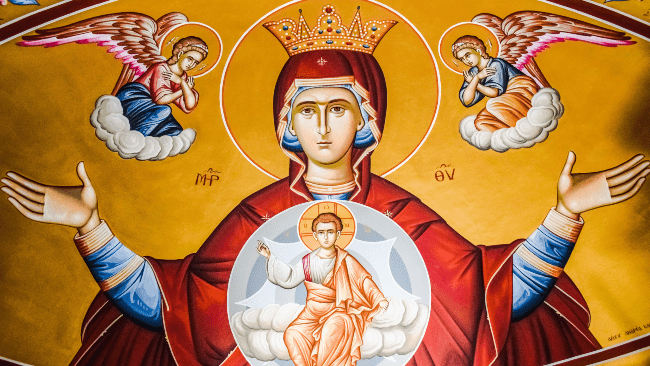
I came across an interesting article in the Catholic publication Commonweal entitled Mother of the Unborn God. It is by Brad East, a professor at the protestant Abilene Christian University, and discusses the Council of Ephesus, the third ecumenical council that met in 431 A.D.
Among the issues the council took up was whether or not the Virgin Mary should be described as “the Mother of God.” Some argued that she should be called “the Mother of Christ”–that is, of the Son of God’s human nature, but not “the Mother of God,” with the title theotokos, or “God-bearer.” The council affirmed that because of the Incarnation, Mary is indeed the “Mother of God.”
This was not a case of undue veneration of the Virgin Mary, of Catholic “Mariolatry.” The Lutheran Confessions affirm the conclusion of the Council of Ephesus. Indeed, that Mary is the “Mother of God” is important to Lutheran Christology as an example of the communication of the two natures of Christ. Here is how the Formula of Concord puts it:
On account of this personal union and communion of the natures, Mary, the most blessed Virgin, bore not a mere man, but, as the angel [Gabriel] testifies, such a man as is truly the Son of the most high God, who showed His divine majesty even in His mother’s womb, inasmuch as He was born of a virgin, with her virginity inviolate. Therefore she is truly the mother of God, and nevertheless remained a virgin. (Formula of Concord, Solid Declaration, Article VIII, 24)
That the Incarnation began with Christ’s conception is set forth in the Apostle’s Creed, which confesses that that the Son of God was “conceived by the Holy Spirit,” and then “born of the Virgin Mary.”
This truth, says East, tells us much about the nature and the value of unborn human life. As such, it speaks directly to the controversies about abortion:
God almighty was conceived in the womb of a Galilean girl a little over two thousand years ago. God underwent the typical course of embryonic and fetal growth common to human beginnings. God was born: a baby boy, utterly dependent and defenseless, loved and cared for by his parents. The conception and birth of Jesus thus bear directly on the question of abortion. It is my contention that, even if Christians had no other resources for thinking about abortion, the doctrine of the Theotokos would be more than enough.
He explains:
The Incarnation begins not with Jesus’ birth, but at his conception. Jesus is like us in every respect except for sin. He is fully God (consubstantial with the Father according to his divinity) and fully man (consubstantial with us according to his humanity). He became human precisely to share all that we are, that we might share all that he is. Jesus, in a word, is the God-man from conception to birth and beyond. The Incarnation therefore comprehends not only natality, but fetality; not only born life, but unborn life; not only the public and the visible, but the private and the hidden. Jesus is God in the flesh. Thus, Jesus is God in the womb. And if he is God in the womb, he is man in the womb, too. What is true of Jesus is, mutatis mutandis, true of all humanity. The unborn are sisters and brothers of Jesus. They, like us, are persons for whom Jesus died. They make claims on us—or rather, through them God makes claims on us. Our response is to be modeled on Mary’s. We welcome and protect these gifts from the Lord. For they, like him, are unseen. And like him, they are destined for glory.
Illustration: Icon of Mary, the Theotokos via PickPik, public domain













